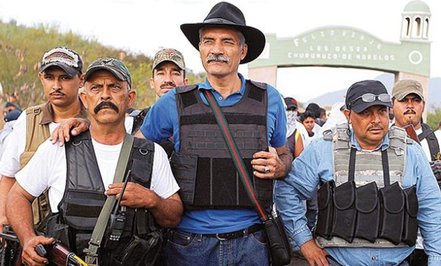B | A documentary about the US-Mexican border. Directed by Matthew Heineman Initial Review by Lane Davis |

“Nailer” Foley, as leader of the Arizona militia, is intent that he and his crew are acting on the side of justice (no matter that stockpiling automatic weapons and then using them to hunt down human beings in the dessert is ethically dubious, even if Arizona law plays fast and loose with immigration enforcement). The ends justify the means in Foley’s world, and his quest to chip away at the foundation of the cartels becomes a part of his own narrative of purification. His life is simple, in his telling, “I once was lost, but now am found, and have taken up arms to justify my existence.”
On the Mexican side, we have Dr. Jose Manuel Mireles. When we first meet “El Doctor” (before we know he’s a doctor), he’s practicing his sharp shooting and waxing poetic about the need to be ready to use force when provoked. When we see him practicing medicine in his clinic, we’re supposed to be reminded of other revolutionary figures—Che Guevera chiefly, who was also a doctor before helping to lead the Cuban revolution in the ‘50’s—who have both the charisma and unnatural resolve to lead in the face of danger and attempted assassinations.
Mireles helps to organize the Autodefensas who began systematically taking back the Michoacan territory from the Knights Templar cartel, which the director, Heineman captures in several stunning scenes of street fights, gun battles, and midnight raids. Where the film soars is in these fast paced, POV scenes—jumping in and out of the back of cars, gun fire echoing through city streets. There were a few points in the film where I thought, “There’s no way this isn’t scripted” but sure enough, this is real, on the ground stuff that Heineman and his crew caught.
By the middle of the film, it becomes evident that maybe the doctor we should associate Mireles with isn’t necessarily a benevolent Che, but is instead a corrupted Faust. In, perhaps, the most chilling scene of the film for me, Mireles leads a group of Autodefensas at a car checkpoint, where they take a suspected Templar and, under Mireles’ order, torture him to gain information and then kill him. In the next scenes we see Mireles playing with his grandchildren and leading inspiring rallies talking about the rights of people to live free and prosper. I’m sure Mireles would also say that the ends justify the means.
What Heineman gets right in this film is the complexity that defies easy explanation. Foley is easier to explain away, as is the whole Arizona narrative, as people provoked by poverty, hardship, and Sean Hannity into paranoia and violence. I’m pretty sure I know who Foley voted for this past election. There’s probably an even deeper story to tell in Foley’s narrative, and Heineman does a good job of getting to much of it, but the stories dramatic arc paled in comparison to the tragedy of the Mexican side.
Mireles is the real star of this movie, and the time allotted to his narrative shows it. Here’s a man that feels passionately about his people, and yet can be as brutal as the people he hunts. Here’s a man who offers his life for protection of the Michoacan population, yet uses his fame and influence to cheat on his wife. Complexity abounds.
The best films on the drug wars widen the implications of involvement beyond the principle actors and indict all of us. “Traffic” and “Sicario” are two good recent example, and “Narcos” on Netflix did a great job of telling the Columbian story. If Heineman’s film ran into any trouble, it’s mainly on just how you end a story like this, because the story itself never does end.
Complex systems don’t simplify themselves. Heineman, thankfully, doesn’t offer easy answers.
Grade: B+
 RSS Feed
RSS Feed